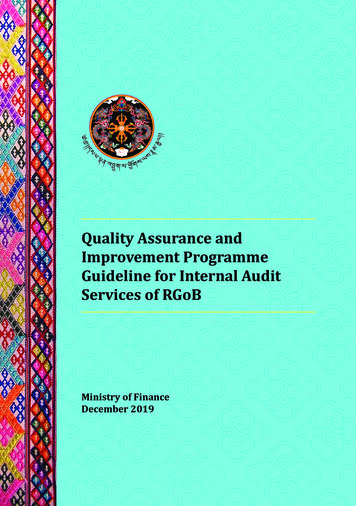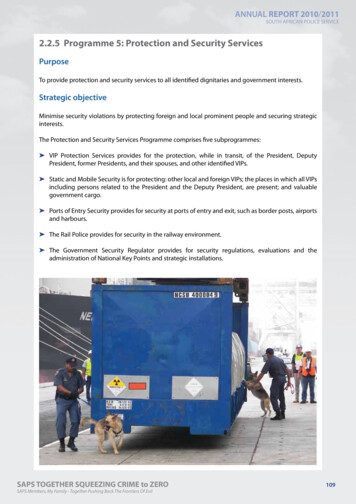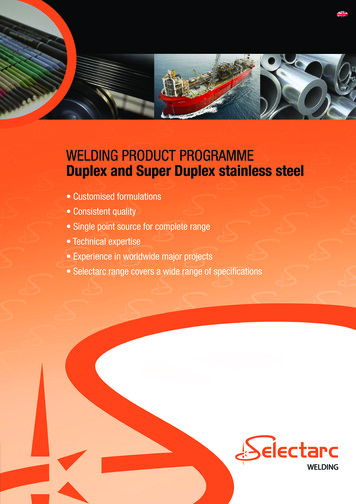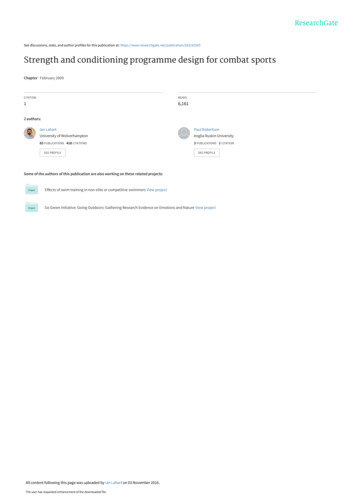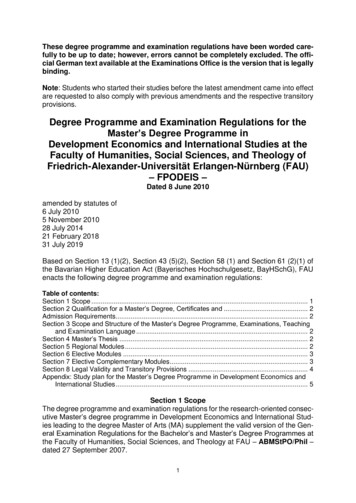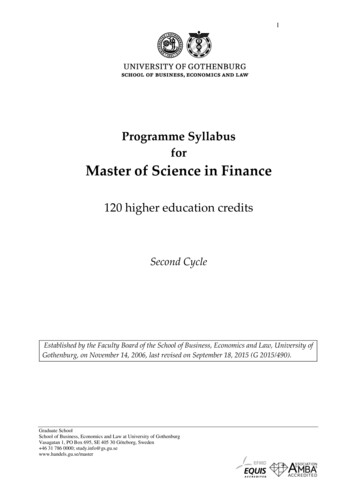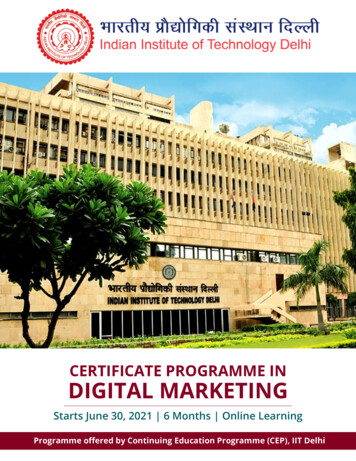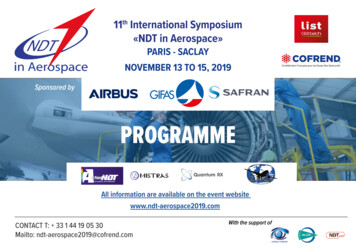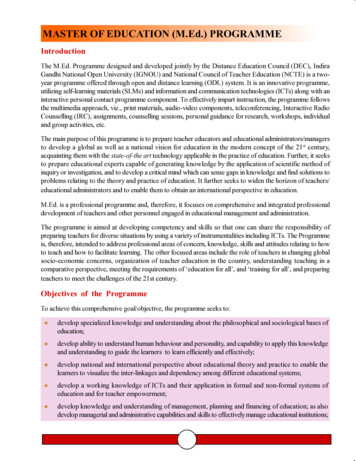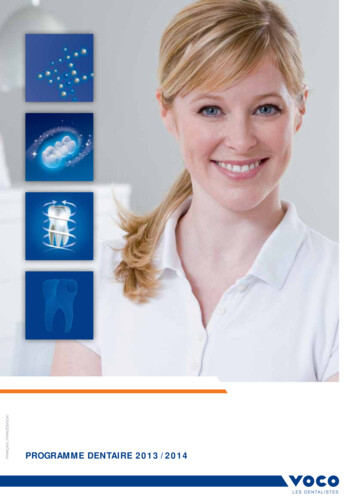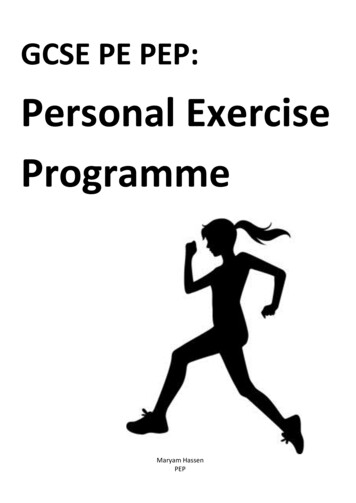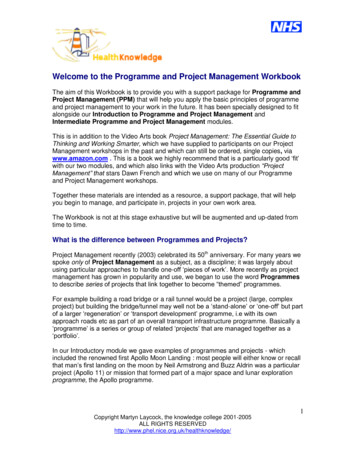
Transcription
Welcome to the Programme and Project Management WorkbookThe aim of this Workbook is to provide you with a support package for Programme andProject Management (PPM) that will help you apply the basic principles of programmeand project management to your work in the future. It has been specially designed to fitalongside our Introduction to Programme and Project Management andIntermediate Programme and Project Management modules.This is in addition to the Video Arts book Project Management: The Essential Guide toThinking and Working Smarter, which we have supplied to participants on our ProjectManagement workshops in the past and which can still be ordered, single copies, viawww.amazon.com . This is a book we highly recommend that is a particularly good „fit‟with our two modules, and which also links with the Video Arts production “ProjectManagement” that stars Dawn French and which we use on many of our Programmeand Project Management workshops.Together these materials are intended as a resource, a support package, that will helpyou begin to manage, and participate in, projects in your own work area.The Workbook is not at this stage exhaustive but will be augmented and up-dated fromtime to time.What is the difference between Programmes and Projects?Project Management recently (2003) celebrated its 50th anniversary. For many years wespoke only of Project Management as a subject, as a discipline; it was largely aboutusing particular approaches to handle one-off „pieces of work‟. More recently as projectmanagement has grown in popularity and use, we began to use the word Programmesto describe series of projects that link together to become “themed” programmes.For example building a road bridge or a rail tunnel would be a project (large, complexproject) but building the bridge/tunnel may well not be a „stand-alone‟ or „one-off‟ but partof a larger „regeneration‟ or „transport development‟ programme, i.e with its ownapproach roads etc as part of an overall transport infrastructure programme. Basically a„programme‟ is a series or group of related „projects‟ that are managed together as a„portfolio‟.In our Introductory module we gave examples of programmes and projects - whichincluded the renowned first Apollo Moon Landing : most people will either know or recallthat man‟s first landing on the moon by Neil Armstrong and Buzz Aldrin was a particularproject (Apollo 11) or mission that formed part of a major space and lunar explorationprogramme, the Apollo programme.1Copyright Martyn Laycock, the knowledge college 2001-2005ALL RIGHTS e/
“A Programme is a collection of projects and other items of work that are managedtogether as a portfolio” Department for Education & Skills „PPM‟ website :http://www.dfes.gov.uk/ppm/Note re “Pilot” Projects :Today we often see organisations run „pilot‟ projects; they run these purposely to find outif and how something works. Then, from the experience they gain in the „pilot‟, they willoften develop further „follow-on‟ projects and larger „programmes‟ of linked projects i.e.they use the outcomes and experience they gain in the „pilot‟ project to inform anddevelop further projects or larger programmes of activity.Our first PPM Scenario, mentioned below and developed in this Workbook, is in fact anexample of a Pilot project – designed to test out the introduction of a PPM approachacross a particular part of the National Health Service (NHS), one of the old HealthAuthorities which in 2001 was approaching, like the rest of the NHS, a period of majortransformational change flowing from the key document “Shifting the Balance of Power”and the radical NHS Plan that flowed from it.The Practical Approach to Programme and Project ManagementThe component parts of Programme & Project Management are largely sensible,logical approaches to planning, implementing and managing work; they have beenbrought together over the years to form a structured, disciplined approach to managinggoal-specific and time-finite activities. Thus, this Workbook encourages throughout apractical, “hands-on” approach to PPM.It provides three separate real-life Scenarios that you can work with. All three arerelevant to healthcare, two of then (the “FeelGood” projects) have a Public Health/HealthPromotion orientation. All three are relatively small projects, used purposely to give youinsights into the fundamentals of PPM. But the underpinning principles of PPM that webring out apply equally to large programmes and projectsTo help you understand the practical application of some of the main tools andtechniques used in PPM we provide you in the Workbook with an example of a ProjectPlan, which has been based on a specially developed Scenario (the “ProjectManagement Project”). We also provide a Template that you can use to plan newprojects in the future. Information and advice is included on a number of recommendedtools that can be used during the setting up and running of a programme or a project.Be sure to refer to the Introduction to Programme and Project Management andIntermediate Programme and Project Management modules on HealthKnowledge:these can not only be viewed in “e-learning” mode but also downloaded to provide youwith a detailed resource to the whole subject of Programme and Project ManagementImportant Note:Programme and Project Management can be as simple or as sophisticated as you oryour organisations want it to be. But there are some core elements that you will need to2Copyright Martyn Laycock, the knowledge college 2001-2005ALL RIGHTS e/
understand and know how to use. It is our aim to show you, using our „FeelGood‟scenarios, how to use a number of key programme and project management tools andtechniques, apply them to practical work-related situations.Hobbs, P. Project Management: The Essential Guide to Thinking and Working Smarter. London:Marshall Publishing, 1999.3Copyright Martyn Laycock, the knowledge college 2001-2005ALL RIGHTS e/
About this PPM Workbook:The Workbook will be available electronically via our knowledge and e-learningplatform “Health Knowledge” which now forms part of the Public HealthElectronic Network (PHeNet); you can use this to find out more aboutprogramme and project managementHere we list the main sections of our PPM Workbook : in electronic format youwill find these will „click-through‟ to the relevant sectionsSection 1: Scenarios (1 and 2)Scenario 1: The „Project Management Project‟Scenario 2: The „FeelGood‟ ProjectSection 2: Project PlanningThe Project Life CycleSample Project Plan (for scenario 1 above)Project Plan templateSection 3: Template for a Project PlanSection 4: Project Management ToolsSWOT analysisPEST analysisForce Field analysisThe 5 WhysCost benefit analysisRisk assessmentWork Breakdown StructuresPERT chartsGANTT chartsComputer-based project management softwareCritical Path AnalysisProject Definition SummaryInformation resources on Project Management4Copyright Martyn Laycock, the knowledge college 2001-2005ALL RIGHTS e/
Section 1: Scenario 1 : „The Project Management Project‟This is our first PPM Scenario, described here exactly as we have used it in ourPPM workshops over the last few years -------------------------The Chief Executive has tasked one of her managers with developing anddelivering a programme of workshops, designed to introduce managers and keystaff to the principles of Project Management as a means of handling particular„pieces of work‟ which have defined time-scales and their own budgets.The Chief Executive (CE) believes that there are quite a lot of „pieces of work‟ potential projects - that could benefit from the „programme and projectmanagement approach; these include some change-management programmesthat will need to start later in the year. The CEO also feels that this initiativecould provide a „platform‟ for the organisation to develop its own in-house„programme and project management „system‟ – a framework that helps peopleset up and manage programmes/projects on an efficient and effective basis thatis used right across the organisation.Whilst the CE is supportive of formal programme and project managementtraining (e.g. Prince) she feels that staff should be introduced to the programmeand project management concept through initial half-day introductory workshops.These will be supported by a PowerPoint presentation, a write-in workbook and an innovation - a Programme and Project Management „Tool-Kit‟.Through discussion, it has been agreed that there will be a pilot workshop, whichwill be run twice, designed to attract a minimum of 18 and a maximum of 25 keystaff at each workshop. Unless appropriate and available resource can belocated internally, an external consultant will be commissioned to work with themanager given responsibility for this project.Delivery and assessment of the two proposed workshops will effectively be a„pilot‟ project and be used to assess whether further workshops and projectmanagement training will be run in the future. For operational reasons these„pilot‟ workshops will be held in late July and late September 2001.There will be a cash budget of up to 3,500 for the pilot phase to cover externalconsultant, materials development and printing, and a suitable venue for each ofthe two half-day workshopsStaff time and indirect costs are estimated as follows:CE: 1 day over the whole project ( 300 per day) 3005Copyright Martyn Laycock, the knowledge college 2001-2005ALL RIGHTS e/
Manager: 6 days over the whole project (@ 175 per day) 1,050Secretary/Admin: 5 days over the whole project (@ 90 per day) 450A small working group will be set up, comprising CE, project manager, externalconsultant and the administrator, and meet monthly to review progress/problems.Feedback from workshop delegates, as well as from the contractor and otherinterested parties will be collated, summarised and reported back to CE by 30thSeptember. Based on the key performance indicators and participant feed-backthe working group will decide whether to recommend further ProjectManagement workshops and training at a meeting scheduled for 1st October. Atthis stage this project will close.If further workshops are recommended they will take the form of a new Project orProgramme.6Copyright Martyn Laycock, the knowledge college 2001-2005ALL RIGHTS e/
Section 2: Project PlanningThe Project Life CycleBelow is a widely recognised model that illustrates the various phases that atypical project goes through. We will use it to take you through the stages,activities and actions that are typically carried out in each phase.The Project Life CLOSE VI-OUTEW{Implementation Phase}FEASABILITYPHASE sometimescalled scoping risk is assessed feasibility tested“GO” or “NO GO”decision made.If “GO” PLANNINGPHASEORGANISINGPHASE tasks resources tools reviews reporting sequencing milestones estimating budgeting communicationsPROJECTPLANIMPLEMENTATIONPHASE activities monitoring: costs progress controlling qualityCOMPLETIONPHASE client “hand-over( acceptance) completedocumentation. review: sign off postimplementation audit maintenance “value assessment”Firstly we look at Phase 1 (Definition), see how we can scope the project,assess its viability, decide whether it should be handled – and if so, how. Wedefine the Project in terms of its outputs („deliverables‟), the budget and timeframe in which it is to be completed.The next phase (2) – Planning - is a critically important phase. In this phase weconsider many aspects of the project and write a Project Plan that, if approved,will be used to guide and steer us through the remaining phases of the Project.Phases 3 (Organise) and 4 (Execute) can be considered together as the“implementation” phase – first the Project Manager/Co-ordinator and his/herteam organise the resources needed to carry out the project, then begin to carry7Copyright Martyn Laycock, the knowledge college 2001-2005ALL RIGHTS e/
out the tasks, actions and activities in accordance with the project plan that willsee the project achieve its aims and objectives. Finally there is a formal CloseOut phase (Phase 5) where the completed project is „handed-over‟ to the clientand all reports and assessments are concluded. There is typically a review and afinal report is written.SAMPLE PROJECT PLANHere we have developed a template for SCENARIO1 (The ProjectManagement Project described --------------------------------PROJECT PLAN TEMPLATEBased on our „Project Management Project‟ scenarioPhase 1: define the scope of the project1. Goals (aims and objectives) of the projectAim of Phase 1:To introduce key staff to the principles and practice of project management, as ameans of handing particular pieces of work in the organisation.Objectives/deliverablesA workshop (which will be run twice), will provide for 2groups of up to 18 keystaff to receive detailed introduction to and training in Project Management. Atthe end of the workshops participants will: be able to identify the key features of projectsunderstand how to identify the key stakeholdershave worked through the project management steps using a given scenariohave learned through practical application and having funbe provided with a guide to Project Management and copies of PowerPointslides as part of a support/resource pack that will also include a work-bookand a project management tool-kit2. Time-scale the project opened on 1st May 2001 with the request to the selected managerto scope and set up the project two workshops are to
Welcome to the Programme and Project Management Workbook The aim of this Workbook is to provide you with a support package for Programme and Project Management (PPM) that will help you apply the basic principles of programme and project management to your work in the future. It has been specially designed to fit alongside our Introduction to Programme and Project Management and Intermediate .
